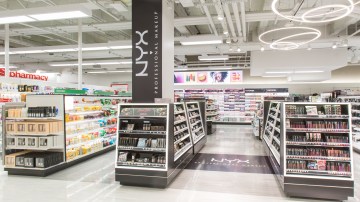Thirteen years ago in Manchester, England, brothers George and Mike Heaton launched fashion brand Represent online with a focus on graphic T-shirts catered to the local streetwear community. On March 30, they’ll open their first store in L.A., which they’ll follow up with a store in Manchester in the summer, followed by another store in London later this year. They plan to open two stores a year going forward.
One of the largest influencer-founded brands that has come out in the U.K., based on revenue, Represent counts Amiri and Fear of God as competitors. Represent did $100 million in revenue last year, up from $63 million in 2022, 70% of which was DTC. It has 150 global stockists, including Saks, Neiman Marcus and Nordstrom, where it sells its main collection and retailer-specific custom pieces. Along with a core line, it has an activewear line called 247, priced $50-$300.
“We’ve got such a long history and we’re a British brand, which is new [in L.A.],” said George Heaton. “Among the stylists and the people in fashion here, it’s a breath of fresh air compared to the [local] brands. A lot of L.A. brands look very similar, and they’re all using the same factories and the same fabrics. It’s repetitive.”
Represent’s L.A. store will be its flagship and located in West Hollywood, on North Robertson Boulevard. Along with the core Represent clothing line, the 3,100-square-foot space will feature an exclusive Robertson Collection. Before opening stores, Represent hosted shop-in-shops with the likes of Selfridges and Harrods in the U.K.
“We always wanted to do retail, but we wanted to wait until our DNA and global reputation was right,” said George Heaton.
With the L.A. store, a goal is to build the company’s business in the U.S., which currently accounts for 20% of revenue. The store is also part of a larger strategy of immersing the brand in key markets and recruiting local talent for international growth. In Europe, Represent is eying Amsterdam and Prague as future store locations. The founders owe the brand’s success to date to its omnichannel marketing strategy and close communication with its customers.
“With Selfridges and Harvey Nichols, they only can buy a certain amount of product,” said George Heaton. “We’re really good at doing exclusives and special collaborations, as well as small launches and drops, so to be able to do that in our own stores is another good talking point for us. Last year, we did 48 launches in 53 weeks.”
George Heaton said the brand will make changes to the L.A. store on a weekly basis, “even if it’s as simple as changing the front window or offering an item before you can get it online.”
The brand’s YouTube channel, Represent Clo, has 27,000 subscribers. The founders also post on their own socials and have appeared on the podcast Diary of a CEO, which is the second most popular podcast in the U.K., based on downloads, according to January 2024 Edison Research rankings.
“It’s more than the clothes. It’s also about the lifestyle we show on social media,” said George Heaton, who documents his life on his personal Instagram account, which has 200,000 followers. “Every young kid wants to either be a YouTuber or have a clothing brand. If we’re able to show them the way by doing our ‘Behind the Brand’ [YouTube] series or going on the Diary of a CEO [podcast] and talking about how long it actually takes [to build a brand], that [helps them].”
And that helps to keep customers coming back. “Our customer return rate is high, so once they’re in, that relationship is very sticky,” said George Heaton. The brand has fueled this loyalty by launching a Vault program, through which it drops products in development, special sale items and limited edition items. Customers can access the Vault by progressing to the top tier of its loyalty program, “Prestige,” where it has over 300,000 customers. Reaching the Prestige tier requires earning 10,000 points by shopping the brand.
Listening to customers’ feedback has also been key to keeping them engaged. The brand has 143,000 members in its Rep Talks Facebook group. “Sometimes, you’ve got to take [what people say there] with a pinch of salt,” said George Heaton. “But you still need to listen to that consumer, because they are the core subculture that bought into the brand.”
The brand’s merchandising, product and marketing teams hold weekly meetings to review the conversations about the brand and its products that are taking place on Facebook, WhatsApp and other communication channels.
Looking ahead, George Heaton said it’s unlikely that Represent’s sweet spot of streetwear will die out, even with weakening demand. “There are always new brands, and different pockets of subcultures that brands can tap into,” he said. “[Success] is in how you talk to the consumer and how you can be that ‘brand of influence.’”




